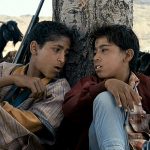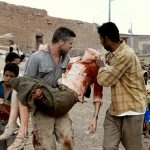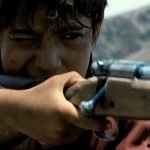Babel – 2006
This was one strange little movie. I knew nothing about it before watching it except what I was shown in the trailer, which made it seem like a thrilling political, international espionage, and terrorism movie. In reality, it had nothing to do with terrorism, nothing to do with international spies, and nothing to do with politics. It was a movie in which a series of random events turn into a lot of pain and drama for a really unfortunate family. The movie is really made up of four different stories, all being told at the same time, though not necessarily in sequential order, all of which are connected with a thin thread of plot connection.
The first story is about Abdullah, played by Mustapha Rachidi and his two sons, Yussef and Ahmed, played by Boubker Ait El Caid and Said Tarchani. They are goat herders in the Moroccan desert. Abdullah buys a rifle from his neighbor to defend his herd from jackals. He gives it to his sons and as Yussef is playing with the new toy, he fires the weapon at a far-away bus full of tourists.
The second story is about Richard and Susan Jones, played by Brad Pitt and Cate Blanchett, who vacationing in Morocco. While riding through the desert on a tour bus, a bullet smashes through the vehicle’s window and hits Susan in the neck. She begins bleeding everywhere. The bus driver takes them to a poor and dirty village where locals do what they can to save her life.
The third story is about Debbie and Mike, played by child actors Ellie Fanning and Nathan Gamble, who are at home in San Diego. Their Mexican nanny, Amelia, played by Adriana Barraza, gets a call from her employer, saying that the children’s mother has been injured, and neither she nor their father can return home. Not wanting to miss her son’s wedding, Amelia takes the children to Mexico. Amelia’s nephew Santiago, played by Gael Garcia Bernal, is to be their ride home. But he gets stopped by the border patrol, panics because he is drunk, and flees the police. He drives far out into the middle of the desert and demands that Amelia and the kids get out of the car. He says that he will lead the police pursuit away from them and then return to pick them up. Unfortunately, he never returns, and the children and their nanny are stranded in the deadly desert with no food or water.
The fourth story is the strangest of all and makes the least sense. Chieko Wataya, played by Rinko Kikuchi, is a teenage deaf mute living in Japan. She is rebellious, angry, and sexually frustrated because of her mother’s suicide. When police come to her apartment asking for her father, she does her best to seduce one of them by removing all her clothes and throwing herself at him. But Detective Kenji Mamiya, played by Satoshi Nikaido, rejects her advances and tells her that the reason he wanted to question her father is because a rifle used in a possible terrorist attack on American tourists in Morocco is registered to her father.
So you can see how the stories are all interconnected, and yet are separate. I’m still having trouble figuring out the Japanese story line. I mean, the rifle, yes, but that almost seemed like a minor subplot in the segment. It is revealed that Chieko’s father Yasujiro, played by Koji Yakusho, had gifted the weapon to his Moroccan guide on a hunting trip. But the real focus was on Chieko as she desperately tries to seduce several young boys, her dentist, and a young police detective into having sex with her. She takes ecstasy and goes to a rave with her friends. None of that has anything to do with the film’s overall plot with the rifle, and the Jones family. It seems like a complete non-sequitur.
One of the things that I actually liked about the movie was the use of language, giving real meaning to the film’s title. English was only spoken in about a third of the film. The rest was in Moroccan, Japanese, Sign Language, and Spanish, all using subtitles. This went a long way to add to the realism of the movie. Director Alejandro Gonzalez Inarritu must have had a very difficult time heading the project. But that was part of the film’s overall theme, the characters’ inability to communicate because of language differences and emotional barriers.
Babel had some pretty good performances. As usual, I liked Brad Pitt and Cate Blanchett. Even though most of Blanchett’s performance was her lying on her back trying not to die, she brought her usual intensity to the part and really made me feel for her. Also, surprisingly enough, Boubker Ait El Caid and Said Tarchani, the two Moroccan boys, did a pretty good job as well.
Babel painted a large tapestry with a compelling story, except for most of the Japanese story which could have been cut because it seemed to contribute nothing to the larger plot. Instead, maybe they could have told the tale of Yasujiro’s hunting trip in which he gave the rifle to his tour guide. It would have made more sense, enhancing the bigger picture instead of detracting from it. But despite this, it was still an enjoyable film to watch, having the feel of an intellectual epic.








